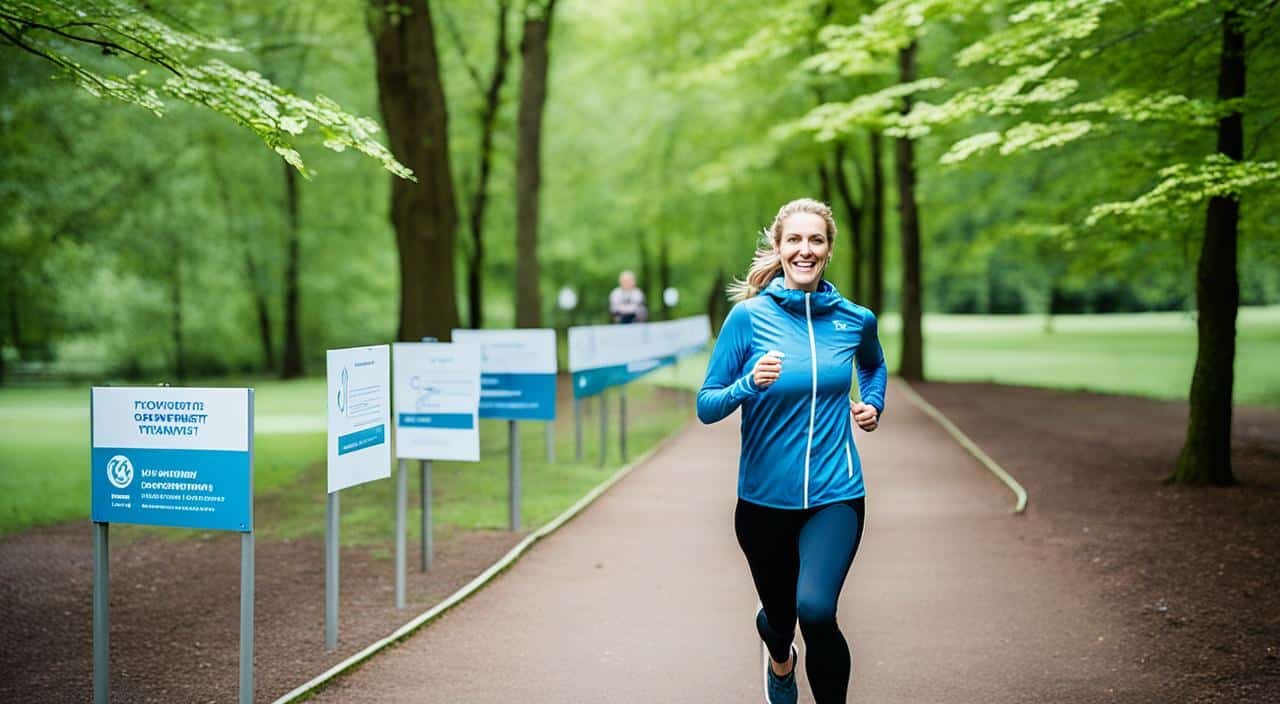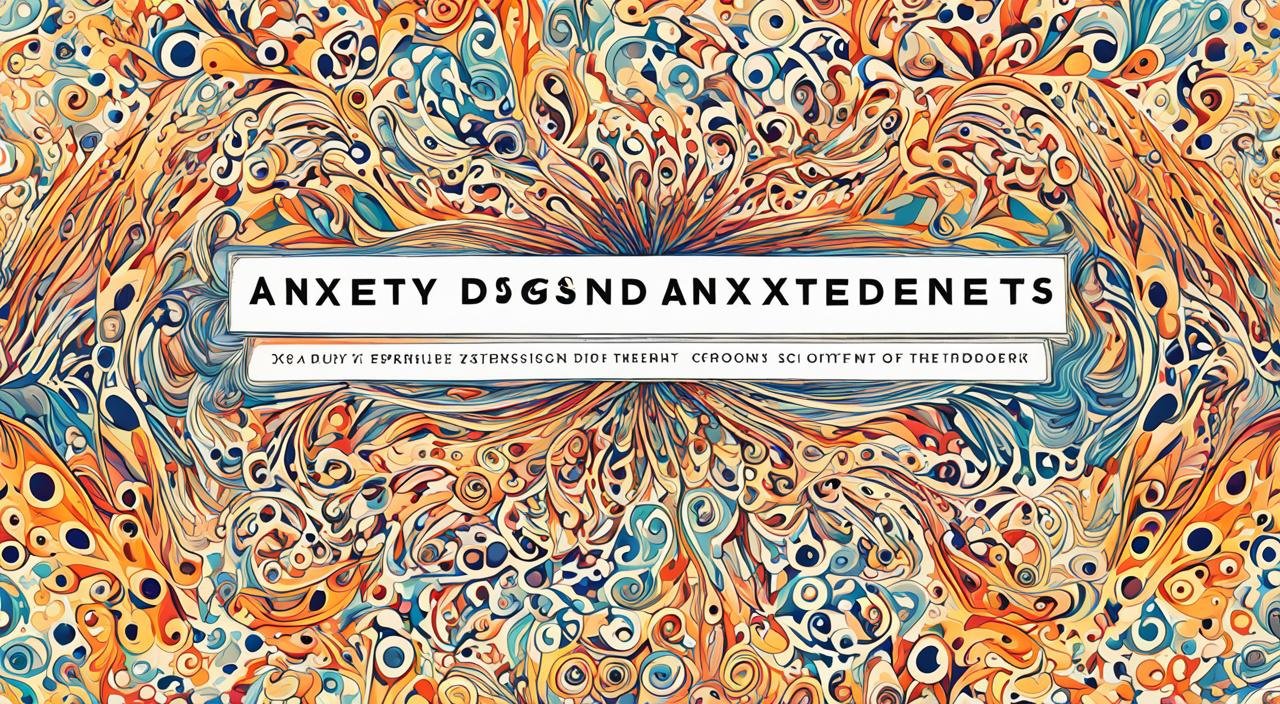Dealing with anxiety can feel overwhelming, but exercise can really help. When we move our bodies, our brains release endorphins. These are the chemicals that make us feel good. This can boost our mood and make us feel better overall.
Exercise can also help us sleep better and feel more confident in ourselves. These changes can help ease anxiety symptoms. This includes issues like generalized anxiety, social anxiety, and panic disorder.
Just a little bit of exercise, like 5-10 minutes, can start to help with anxiety. It can make our brains better at handling stress. In some cases, exercise might even work as well as medicine for anxiety and depression.
Adding exercise to your daily life can be a great way to fight anxiety. It’s a way to take care of your mental health.
Key Takeaways
- Exercise triggers the release of endorphins, the brain’s natural feel-good chemicals, which can elevate mood and promote well-being.
- Regular physical activity has been shown to decrease levels of tension, improve sleep quality, and boost self-esteem – all of which can help alleviate anxiety symptoms.
- Even moderate exercise for a short duration can begin to produce anti-anxiety effects by helping the brain cope better with stress.
- Exercise may be just as effective as medication for some people in reducing anxiety and depression symptoms over the long term.
- Incorporating physical activity into your daily routine can be a proactive approach to managing anxiety and supporting your overall mental health.
The Connection Between Exercise and Anxiety Relief
Regular physical activity greatly helps mental health, especially with anxiety. Activities like running, cycling, or swimming lower tension and boost mood. They also make you feel better about yourself, which helps with anxiety.
Also Read :How Do You Apply For University Scholarships?
Understanding the Benefits of Physical Activity for Mental Health
Exercise makes the body release endorphins, which make you feel happy and well. Physical activity also improves cognitive function, helping the brain plan and organize better. This can help manage anxiety and stress. Plus, it helps you sleep better, which is key for fighting anxiety since lack of sleep makes it worse.
- Reduces overall tension and stabilizes mood
- Improves cognitive function and self-regulation
- Enhances sleep quality, crucial for managing anxiety
“Regular participation in aerobic exercise has been demonstrated to decrease overall tension, stabilize mood, improve sleep, and enhance self-esteem – all of which can have a positive impact on anxiety.”
Adding physical activity to your daily life can really help if you’re anxious. It brings many mental health benefits that ease symptoms and boost your well-being.
Exercise as a Natural Antidepressant
Many studies show that exercise can be a natural antidepressant. It helps improve mood and lessen anxiety and depression symptoms. Exercise’s physical and mental perks, like releasing endorphins, better sleep, and higher self-esteem, greatly help mental health.
A short 10-minute walk can ease anxiety and depression for several hours, just like some medicines. Adding physical activity to your life can lead to lasting better mental health.
Exercise is a great way to boost mood and ease stress. It also helps cut down on anxiety and offers a natural way to tackle mental health issues.
“Regular exercise can have a profoundly positive impact on depression, anxiety, and other mental health concerns. It is a powerful antidepressant that has the added benefit of improving physical health as well.”
Staying active can bring big mood and stress relief benefits. It’s a key tool for handling anxiety and other mental health issues.
| Benefits of Exercise for Anxiety and Depression | Timeframe |
|---|---|
| Releases endorphins, the “feel-good” chemicals in the brain | Immediate |
| Improves sleep quality | Long-term |
| Enhances self-esteem and confidence | Long-term |
| Reduces stress and anxiety levels | Both immediate and long-term |
The Impact of Anxiety on Physical and Mental Health

Anxiety is a common mental health issue that affects both the body and mind. If not managed, it can throw off the body’s balance of chemicals and hormones.
This imbalance can lower the levels of serotonin and dopamine, while raising cortisol levels. These changes can harm sleep, focus, and productivity.
Anxiety can also make you feel irritable, moody, and cause changes in weight and digestion. It can even raise the risk of serious health problems like high blood pressure and heart issues.
| Anxiety Impact | Effect on Physical Health | Effect on Mental Health |
|---|---|---|
| Sleep | Disrupted sleep patterns, insomnia | Fatigue, irritability, decreased focus |
| Concentration | Difficulty focusing, reduced productivity | Decreased cognitive performance |
| Mood | Increased risk of high blood pressure | Irritability, depression, mood swings |
| Weight | Weight gain, digestive problems | Body image issues, decreased self-esteem |
Dealing with anxiety impacts by making lifestyle changes, like exercising regularly, is key. It helps keep both physical and mental health in check. By managing anxiety, people can reduce its negative effects and improve their overall well-being.
Also Read :How Can A University Library Help You Succeed?
Anxiety

Anxiety is a common feeling we all have sometimes. It makes us feel scared, worried, and uneasy. But when these feelings don’t go away and start to mess with our daily life, it might be an anxiety disorder.
In the United States, anxiety disorders are the most common mental health issue. They affect about 40 million adults. There are different kinds of anxiety disorders, like generalized anxiety disorder, social anxiety disorder, and panic disorder. Each one has its own set of symptoms and reasons.
To handle anxiety, a mix of lifestyle changes, therapy, and sometimes medicine is key. Knowing about the types of anxiety disorders and their symptoms helps people take action for their mental health. This can make a big difference in how they feel overall.
Developing an Anxiety-Fighting Exercise Routine
Creating a good exercise routine to fight anxiety means picking activities you like, making a flexible schedule that suits you, and setting achievable goals. The goal is to make exercise feel like a normal part of your day, not a task.
Finding Enjoyable Physical Activities
Try out different activities like walking, jogging, strength training, and dance classes to see what gets you going. Keep trying until you find activities you really enjoy. Doing things you like makes your exercise routine feel good, not like a chore.
Creating a Flexible Schedule
Do short, frequent physical activities during the day, like taking the stairs or walking during breaks. This flexible schedule makes it easier to fit exercise into your day. It helps you keep up with your anxiety-fighting plan.
Setting Achievable Goals
Begin with easy goals and slowly increase your workouts as you get stronger and more confident. Setting achievable goals keeps you motivated and focused. It makes sure your exercise routine stays a key part of managing stress and anxiety.
Keeping a positive attitude and celebrating small wins helps you keep up with an anxiety-fighting exercise routine. By enjoying activities, having a flexible schedule, and setting realistic goals, you can create a physical activity plan that boosts your mental health and well-being.
Also Read :Can Natural Remedies Help With Flu Symptoms?
Exercise as Part of a Comprehensive Treatment Plan

Exercise is great for managing anxiety. But it should be part of a bigger comprehensive treatment plan. This plan might also include therapy, medication, and other lifestyle changes. For some, just exercise might not be enough to help with anxiety. A mix of treatments might be needed.
Talking to a healthcare expert is key to making a treatment plan that fits you. They can mix exercise with therapy, medication, or other treatments. This way, you can better manage anxiety and improve your mental and physical health.
| Treatment Approach | Benefits |
|---|---|
| Exercise | Enhances mood, reduces stress, and improves overall physical and mental well-being. |
| Therapy | Provides a safe and supportive environment to address the underlying causes of anxiety. |
| Medication | Can help manage anxiety symptoms, especially in cases of severe or persistent anxiety. |
| Lifestyle Interventions | Includes practices such as mindfulness, stress management, and social support to promote overall well-being. |
Using a comprehensive treatment plan with different approaches helps people with anxiety. It works on both the mental and physical sides of the issue.
“A comprehensive approach to managing anxiety, incorporating both exercise and other evidence-based treatments, can lead to more lasting and meaningful improvements in overall health and well-being.”
Also Read :What Courses Does Purdue University Offer?
Types of Anxiety Disorders and Exercise Benefits

Anxiety disorders have different forms, each with its own set of symptoms and causes. It’s important to know these differences when looking at how exercise can help.
Generalized Anxiety Disorder
Generalized anxiety disorder (GAD) means feeling worried too much about many things, like work, health, and family. People with GAD might feel muscle tension, get tired easily, and have trouble focusing. Exercise can lessen these symptoms, making it easier to handle anxiety.
Social Anxiety Disorder
Social anxiety disorder (SAD) is about being very scared or anxious in social situations. This fear can lead to avoiding social events and feeling a lot of distress. Exercise is great for those with SAD because it boosts confidence, improves mood, and gives a sense of achievement. Group activities can also help people with SAD face their fears.
Panic Disorder
Panic disorder is all about having panic attacks that come out of nowhere and can be very scary. Exercise is a good way to deal with panic disorder. It can make panic attacks less intense and happen less often. Regular physical activity also helps people with panic disorder feel better overall and learn how to handle their anxiety better.
Adding exercise to a treatment plan can really help with anxiety disorders. It can make anxiety symptoms less severe and less frequent. Exercise also improves mood and helps people deal with their anxiety in a better way.
| Anxiety Disorder | Key Characteristics | Exercise Benefits |
|---|---|---|
| Generalized Anxiety Disorder (GAD) | Persistent and excessive worry about various issues | Reduced severity and frequency of symptoms, better symptom management |
| Social Anxiety Disorder (SAD) | Intense fear or anxiety in social situations | Improved self-confidence, mood, and social interaction |
| Panic Disorder | Recurrent, unexpected panic attacks | Reduced intensity and frequency of panic attacks, enhanced coping mechanisms |
Also Read : What Are Natural Remedies For Chickenpox Relief?
Overcoming Barriers to Exercise

Starting an exercise routine to help with anxiety can be tough. Many people face barriers like not enjoying it, having a busy schedule, or not having access to places to work out. Physical limitations and health issues can also make it hard.
To get past these obstacles, find exercises you enjoy. This makes it easier to keep up with your routine. Try fitting in short workouts throughout the day to make exercise a part of your life.
If getting to a gym is hard, look into low-impact or home workouts. These can be easier on your body. Getting support from doctors, family, or friends can also help you stay motivated and on track.
By tackling the barriers you face, you can create a workout plan that helps with anxiety and boosts your health. The key is to find what works for you and your needs. This way, exercise can be a powerful tool in fighting anxiety.
| Barrier | Potential Solutions |
|---|---|
| Lack of enjoyment or motivation |
|
| Difficulty fitting exercise into a busy schedule |
|
| Limited accessibility to exercise facilities or equipment |
|
| Physical limitations or health concerns |
|
Combining Exercise with Other Stress-Management Techniques
Exercise is a great way to handle anxiety, but it works best with other stress-reducing methods. Using physical activity, mindfulness, and proven therapies together can help manage anxiety better. This approach improves mental health and overall well-being.
Mindfulness and Meditation
Mindfulness and meditation teach us to be more aware of the present moment. They help us focus on breathing, body feelings, and what’s around us. This stops us from worrying too much about the past or future.
Cognitive-Behavioral Therapy
Cognitive-behavioral therapy (CBT) is a proven way to deal with anxiety. It helps us spot and fight negative thoughts. It also teaches us better ways to cope and solve problems.
Using exercise, mindfulness, and CBT together can really help reduce stress and anxiety. This full approach can make a big difference in mental health and happiness.
“Exercise, mindfulness, and cognitive-behavioral therapy work together synergistically to provide a powerful antidote to the debilitating effects of anxiety.”
Also Read: The Impact Of The American Medical Association: A Comprehensive Overview
Conclusion
Exercise is a great way to handle anxiety and boost mental health. It can lessen anxiety, make you feel happier, improve your thinking skills, and help you sleep better. These are key for feeling good overall.
Exercise might not work for everyone on its own. But when you add it to a plan that includes therapy, meditation, and other proven methods, it can be very powerful. This mix can help manage anxiety for the long term.
By picking fun activities to do, making a flexible exercise plan, and mixing it with other ways to reduce stress, you can improve your mental and physical health. The link between exercise and better mental and physical health is strong. It’s a key part of a full approach to staying well.
Exercise is a natural, easy, and effective way to deal with anxiety and support your health. By making it a regular part of your life, you can better handle anxiety and take charge of your mental and physical health.
FAQs
Q: How can exercise help with anxiety?
A: Exercise can help with anxiety by reducing stress hormones, improving mood through the release of endorphins, promoting better sleep, and providing a distraction from negative thoughts.
Q: What are the symptoms of anxiety?
A: Symptoms of anxiety may include feelings of worry or fear, physical symptoms like increased heart rate and sweating, and difficulty concentrating.
Q: What are some risk factors for anxiety?
A: Risk factors for anxiety may include genetics, brain chemistry, personality, and life experiences such as trauma or stress.
Q: Can anxiety be linked to depression?
A: Yes, anxiety and depression often coexist and share similarities in symptoms and treatment approaches.
Q: What are some common treatments for anxiety?
A: Treatments for anxiety may include therapy, medication, lifestyle changes, and self-help techniques such as relaxation exercises or mindfulness.
Q: Are there support groups available for people with anxiety disorders?
A: Yes, support groups can provide a sense of community, understanding, and coping strategies for individuals dealing with anxiety disorders.
Q: What are the possible causes of anxiety?
A: Causes of anxiety can vary and may include genetics, brain chemistry, personality, life experiences, and environmental factors.
Source Links
- https://www.mayoclinic.org/diseases-conditions/depression/in-depth/depression-and-exercise/art-20046495
- https://adaa.org/living-with-anxiety/managing-anxiety/exercise-stress-and-anxiety
- https://www.henryford.com/blog/2021/12/how-exercise-can-help-reduce-your-anxiety




